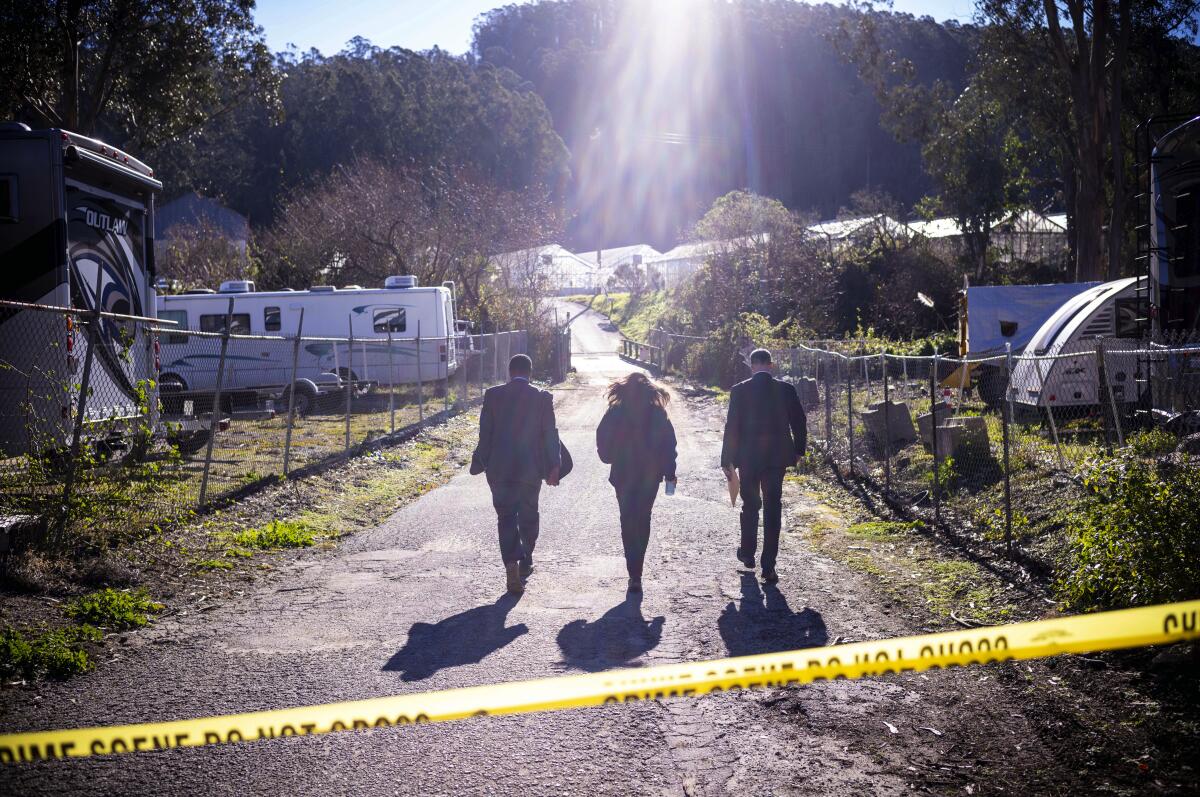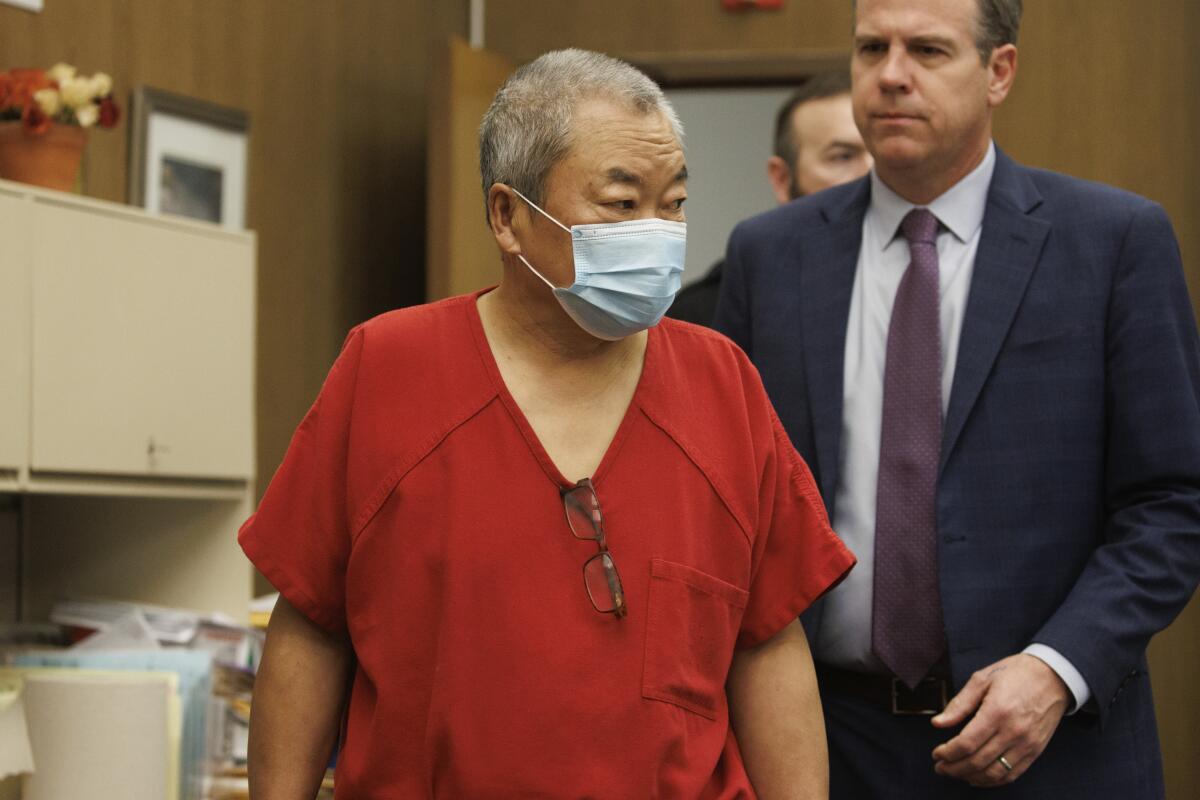Exploitation, retaliation, alarming conditions: Inside the crisis at West Coast mushroom farms

- Share via
SUNNYSIDE, Wash. — There had been rumors swirling that the mostly female workforce at the mushroom farm in Sunnyside, Wash., was getting replaced with men, but Isela Cabrera tried to keep her head down, and hold on to her job.
Then hourly quotas for picking mushrooms increased. Women she worked alongside were getting written up, or let go. Co-workers were disciplined or fired for calling in sick or refusing to work 12-hour shifts because they had children at home.
It wasn’t long before new workers, mostly men, were bused into the farm in vans, taking the place of the fired women. Some of the new pickers looked like they were no more than 15 years old, several current and former workers at the farm told The Times.
“Little by little, they’re getting rid of the local workers,” said Cabrera, who worried the job she had for more than two years was at risk. “They fired people without saying anything, just gone.”
Ostrom Mushroom Farms agreed to pay a $3.4-million fine in May to settle a lawsuit filed by Washington’s Office of Attorney General, which accused the business of discriminating against its employees by replacing its mostly female workforce with male guest workers brought into the country through the federal H-2A Temporary Agriculture Program.
The program is meant to help companies find foreign labor when local workers are unable or unwilling to do the work. But prosecutors and workers say the company was trying to replace local employees with foreign workers who could be paid less and were willing to work longer hours.
The allegations of retaliation and worker discrimination surfaced only after workers tried to organize a labor union, just as hazardous working and living conditions were discovered at another mushroom farm in Half Moon Bay, Calif., only after a disgruntled worker killed seven people.
Advocates say the conditions in the mushroom farms in Sunnyside and Half Moon Bay highlight how discrimination and illegal working conditions in the industry can often go unreported because workers — who have few resources or advocates— are afraid to speak up for fear of being fired.
“It took a shooting for stuff to come forward in Half Moon Bay,” said Antonio De Loera-Brust, spokesperson for the United Farm Workers Union, which worked to unionize the Sunnyside farms. “It’s taken an extensive organizing campaign and actions by workers to come to light in Ostrom, which makes you think — where are the places where this is happening without anyone knowing?”
Marciano Jimenez Martinez was also “a good son, brother, uncle and a great friend.” He and six others killed in the Half Moon Bay shootings are recalled by loved ones.
Ostrom sold the farm in the middle of the lawsuit to Windmill Farms, but officials said the terms reached by the settlement will also pertain to the new owners.
Days before the Washington attorney general announced the settlement, investigators disclosed in documents obtained by The Times that a federal probe was also underway into allegations of wage theft, violations of the H-2A program and child labor laws on the farm. It was not clear what prompted the federal investigation, but labor organizers say they have been calling for such intervention for months.
Officials at Ostrom Mushroom Farms and Windmill Farms did not respond to questions about the suit settlement and ongoing investigation.
Although minors are allowed to work on farms, according to the Washington State Department of Labor & Industries, those who are 14 or 15 years old are limited to three hours a day and 21 hours a week on school weeks. Those who are 16 and 17 are allowed four hours a day and 28 hours in a school week.

Multiple former and current workers at the farm said those who appeared to be minors easily exceeded those daily work limits.
One former worker, who asked not to be identified for fear of being deported, told The Times he was brought to the farm as a contractor when he was 17. He believes he arrived as an H-2A worker, but said he was unsure because he doesn’t know how to read, saying his paperwork was handled by the recruiter who took him to Washington for work.
He came to the U.S. on a work visa, but owed about $10,000 to the company that helped handle his paperwork and transportation, he said.
There was no work for him in Mexico, he said, and his family needed the help. At the farm, he regularly worked up to 15 hours a day, he said.
“I needed to work because of my family,” he said. “I left to get ahead because there was no money there.”
When workers spoke up about working conditions, Washington Atty. Gen. Bob Ferguson said at a news conference, managers at the farms retaliated, threatened their jobs and at least once assaulting a worker.
The company’s actions, Ferguson said, were “calculated, systemic discrimination” intended to “force out female and Washington-based employees.”
Officials are looking to see if they can help farmworkers find new homes and work after two shootings left seven people dead in Half Moon Bay on Jan. 23.
Nearly two months after the lawsuit settlement, current and former workers at the farm say their jobs are still at risk. Retaliation is still a threat, and many fear being replaced by foreign workers who continue to be driven into the farm as contract laborers. Workers voted in September 2022 to unionize but the company has not recognized the union.
State and federal investigations into the 43-acre farm in Sunnyside have confirmed some of the workers’ claims.
On Thursday, the U.S. Department of Labor Wage and Hour Division announced that Ostrom Mushroom farms failed to pay migrant workers the required wage and provide them cooking facilities, violating specific requirements from the H-2A visa program.
Ostrom farms also failed to get inspections of worker housing facilities, as well keeping required pay stubs, the federal agency said.
One migrant worker, according to the agency, was found to have paid a recruiter $10,000 for a visa, another violation of the H-2A program.
The Department of Labor recovered $59,850 in unpaid wages for 62 workers, according to the agency, and levied $74,642 in penalties for the violations.
“Employers participating in the H-2A guest worker program must make sure that they provide housing as required, that housing is sanitary, that vehicles used to transport workers are safe and that workers are paid correctly for all hours they work,” said Thomas Silva, district director of the Wage and Hour Division of the Department of Labor. “Our nation depends on agricultural industry workers to feed our families, and we are committed to making certain industry employers fulfill their legal responsibilities.”
Since the lawsuit was settled, UFW representatives say 13 more local workers have been fired from the farm, including three who were part of the labor union organizing committee. Four others left of their own accord, but cited retaliation as the reason for leaving.
A letter from the U.S. Department of Labor, dated May 11, asks that anyone who has worked at the farm since Aug. 22, 2021, be given “prosecutorial discretion” by the Department of Homeland Security — meaning that they not be placed on immigration proceedings to be deported so they could be available to cooperate with the investigation.
“The investigation will determine whether Ostrom Mushroom Farms, LLC has complied with H-2A program obligations, minimum wage, child labor, and overtime pay requirements,” the letter reads.
Labor organizers say the workers are in a precarious position, similar to what other field laborers across the country face. Workers are eager to improve their working conditions but scared that speaking up can cost them their livelihoods.
Pitting foreign workers against local employees, and exploiting vulnerable workers, is common in the industry, UFW officials said, and much of it never gets public scrutiny.
“I’m sure there are other places where this is happening that we’re not aware of,” said De Loera-Brust.
In Half Moon Bay, workers were found to be living in homes that had not been approved or inspected by local or state officials. Images showed structures with plastic walls, unfinished floors and propane tanks used for outdoor cooking.
These tragedies are happening everywhere. It just happens to be mushrooms that we’re talking about, but it’s happening everywhere, it’s happening in every industry.
— Teresa Romero, United Farm Workers
Workers in Colorado said a mushroom farm that had employed them closed suddenly, leaving them owed thousands in unpaid wages. They also alleged that some workers who suffered injuries due to unsafe working conditions had been threatened with having immigration authorities called if they complained, the Colorado Sun reported.
UFW officials say the troubles are not limited to the mushroom industry. In November 2021, two dozen people were indicted by the U.S. Department of Justice in what was called “Operation Blooming Onion,” a multi-year investigation into allegations that workers from Mexico and Central America had been held in unsanitary, fenced-in camps, were underpaid and threatened at gunpoint to work in farms in Georgia. The defendants, officials alleged, fraudulently used the H-2A visa program. Officials described conditions, where workers were raped, sold and traded to other conspirators, as “modern day slavery.”
“These tragedies are happening everywhere,” said Teresa Romero, president of the UFW. “It just happens to be mushrooms that we’re talking about, but it’s happening everywhere, it’s happening in every industry.”
Even when wrongdoing is found by companies, the penalties are often not significant enough to bring about change, Romero said.

In Half Moon Bay, the two mushroom farms were fined for dozens of violations, including not having plans to notify employees in case of an emergency, like an active shooter, and failing to provide safety training.
Concord Farms, cited for 19 violations, according to Cal/OSHA, was fined $51,770. California Terra Garden was fined $113,800 for 22 violations.
For putting workers in illegal housing conditions, the farms were cited $400 each, according to records.
Enforcement of worker-protection laws can be lax and employees dependent on the work risk losing their livelihood by coming forward, she said.
“The laws on the books are not the laws in the fields,” Romero said.
I’m enduring these injustices because I need to. I have to.
— An anonymous mushroom worker
Despite the $3.4-million settlement with Ostrom Mushroom Farms, workers say they still fear losing their jobs if they speak up.
Maria Toscano, 30, quit her job at Ostrom farms in June 2022, but is still a member of the union organizing committee. She remained involved, she said, because she saw women being fired when they refused to work long hours with kids waiting at home.
“They’d say it was because we have kids, because we have appointments,” she said. “So we don’t have a right to have a job just because we’re mothers?”
Without knowing ahead of time when they could go home, Toscano said, it was difficult for mothers like her to plan ahead for doctor appointments for her children, or to know when she’d need someone to watch over her kids late into the night.
She’s still working as a picker at a nearby farm, she said. The work is not as reliable and the pay is less.
“They treat me better, though,” she said.
A current Windmill employee, who asked not to be identified, said not much has changed since the lawsuit settlement. In some cases, 15 people are being assigned the work that once was done by 40, the worker said.
She still sees the contractor vans of male workers pulling into the farm, she said. She and others still worry they will be eventually pushed out.
One of the contract workers, she said, told her they were 15 years old, yet they regularly worked 15-hour days for about six months.
“There’s something wrong going on,” she said.
“Every day, we don’t know if we’ll have a job,” said one worker. “I’m enduring these injustices because I need to. I have to.”
The stress, she said, has caused her to have painful headaches.
“They humiliate you just so you can earn a cent for your kids,” she said. “I think I’m going to lose it. I can’t take it anymore, but I will try.”
More to Read
Sign up for Essential California
The most important California stories and recommendations in your inbox every morning.
You may occasionally receive promotional content from the Los Angeles Times.













